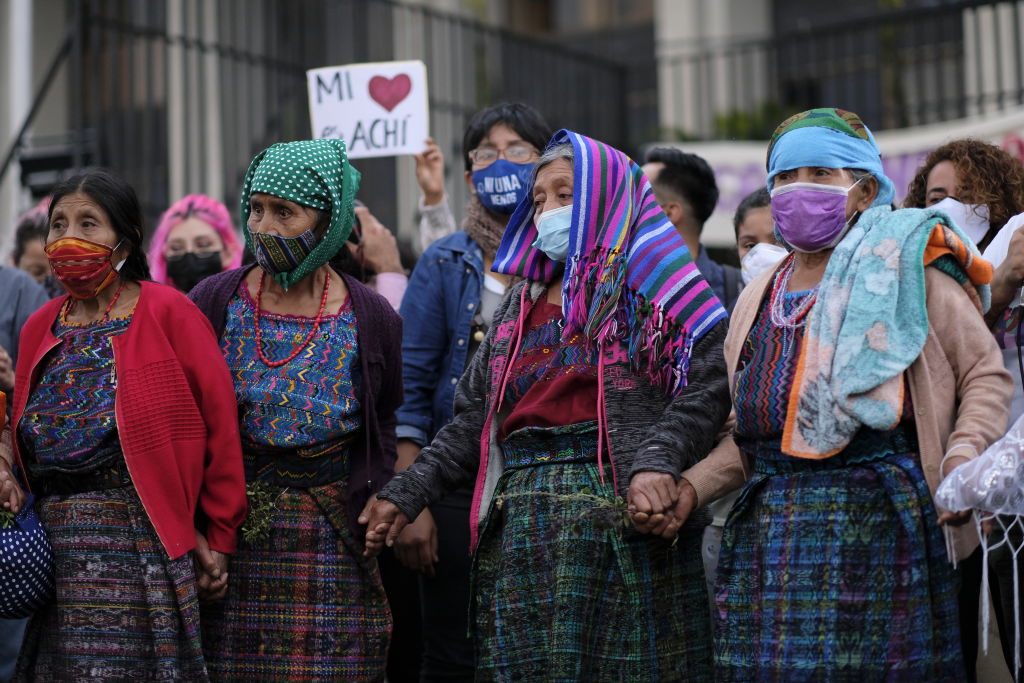
For four decades, Pedrina López de Paz lived in shame, traumatized by the rape she endured as a 12-year-old at the hands of local militia, impoverished, bullied, and stigmatized. But as the 52-year-old Maya Achi survivor read her victim statement to a Guatemalan courtroom on Jan. 24, shame gave way to indignation. “I am a woman, I have endured pain,” she said. “Everything that happened has stayed in my body.”
It’s a story López de Paz shares with thousands of Indigenous women in Guatemala who suffered systematic sexual violence during the country’s 36-year civil war. Accused by the ruling elite of aiding leftist guerrilla forces, the country’s Mayan population was subjected to a genocidal campaign during which more than 160,000 were slaughtered. Mayan women bore the brunt of the military’s racist tactics—the Commission for Historical Clarification documented 1,465 cases of sexual violence between 1960 and the war’s end in 1996, of which 89% of victims were Indigenous women. The commission stressed that the figure did not reflect the true scale of sexual violence, due to the difficulties in reporting and gathering evidence. For survivors like López de Paz—whose parents were abducted at the time of her rape and never seen again, leaving her to care for her four younger siblings—suppressing the memory of sexual violence was necessary for survival.
For 40 years, the Indigenous survivors of what has become known as the Silent Holocaust carried their trauma like López de Paz, in their bodies. That is, until dozens of victims from the Maya Achi community made the three-and-a-half-hour journey in January from their rural hometown of Rabinal to Guatemala City to make what happened to them public. “We are here, we are speaking the truth,” López de Paz told the court.
And finally, she was heard. In a critical ruling Jan. 24, the court sentenced five men to a total of 150 years in prison for rape and crimes against humanity, which they denied. Outside the courtroom, groups of women in their 50s and 60s laid flowers and candles on the ground. Others held colorful banners blazoned with the slogan, “We Are All Achi”—a sign of solidarity with their sisters in the courtroom.
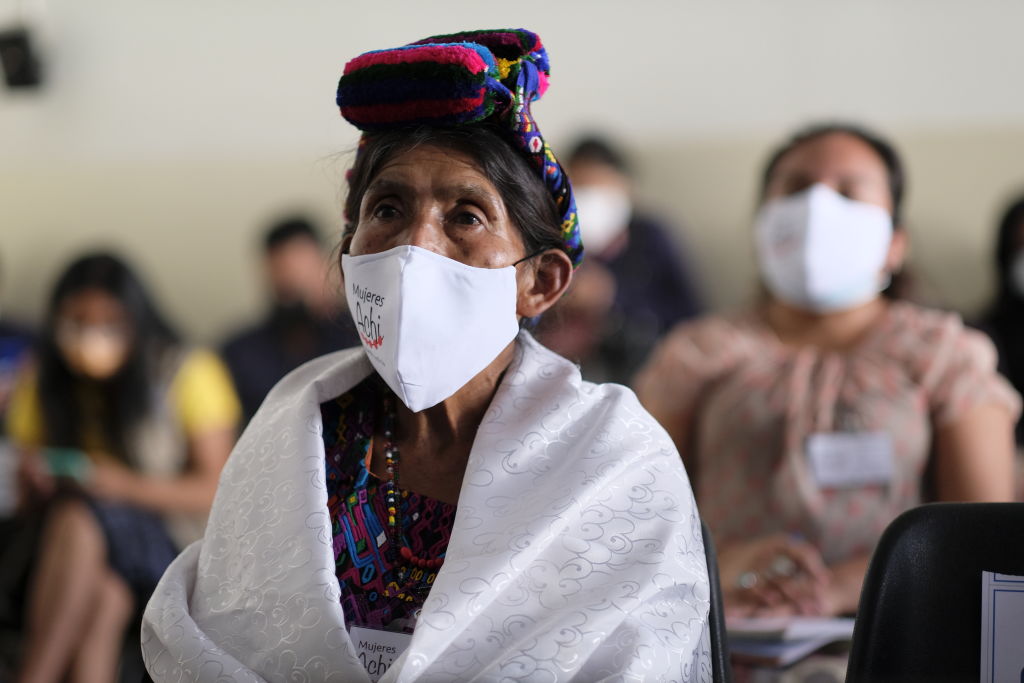
It was a rare victory for Indigenous women in a country that has long undervalued them, but the case is far from over. At least three more men who were initially named in the case have yet to stand trial, and a fourth remains a fugitive, meaning dozens of survivors still are waiting to see their rapists put behind bars. And while Rabinal Legal Clinic, the law firm that represents the Achi women, is determined to see the other men face charges, observers of the case say lawyers and survivors should aim higher.
The next target should be “the people who put this whole strategy in motion,” says Dr. Jo-Marie Burt, an associate professor of Latin American Studies at George Mason University. By that, Burt means the Guatemalan army, which she fears could evade responsibility as survivors and perpetrators grow old and die, and as President Alejandro Giammattei’s government remains bogged down by accusations of corruption.
Mass rapes were “the result of the strategy deployed by the Guatemalan army during the internal armed conflict to defeat the guerrillas,” Burt told TIME from the trial, which she was documenting for Truth and Justice Guatemala, an organization that monitors transitional justice cases in the country. “It was very much a divide and conquer mentality.” The men in this case were members of the Civil Self-Defense Patrol (PAC), local militia forces created by the Guatemalan army as a means to control and subdue the rural, mostly Indigenous populations. Participation was officially voluntary, but many men were forced to join and inflict violence on their own communities. All five of the men sentenced in the Achi case were Achi themselves. Some of the victims were related to their attackers. While López de Paz saw her attackers jailed, many of the authority figures and power structures that sanctioned the destruction of Indigenous communities from within are still at large.
The ruling in January is only the second time that wartime sexual violence against Indigenous women has been successfully prosecuted in Guatemala. In 2016, a former military officer and a former commissioner were found guilty of the sexual enslavement of 15 Maya Q’eqchi’ women at a military base in the early 1980s. So normalized was the violence that women were injected with shots of contraceptives before being taken to special rooms where they were raped repeatedly by several men at a time. The Sepur Zarco trial—named after the military outposts in eastern Guatemala where the crimes were committed—was a watershed moment in the transitional justice process. In a historic ruling, the court not only sentenced the men who orchestrated the violence, it held the state responsibile for the use of rape as a weapon of war.
Sexual violence has been used as a weapon of genocide in wars across the world, from Rwanda to the former Yugoslavia, to undermine the social fabric of society. In Guatemala, the targeting of Mayan women became part of a strategy of ethnic cleansing.
“They attacked an element, a very important person in the community,” Lucía Xiloj, one of the lawyers representing the Maya Achi women, told TIME. “It wasn’t only for the purpose of excluding individual women. The damage transcended to the communities. That’s why the communities are totally disintegrated today.”
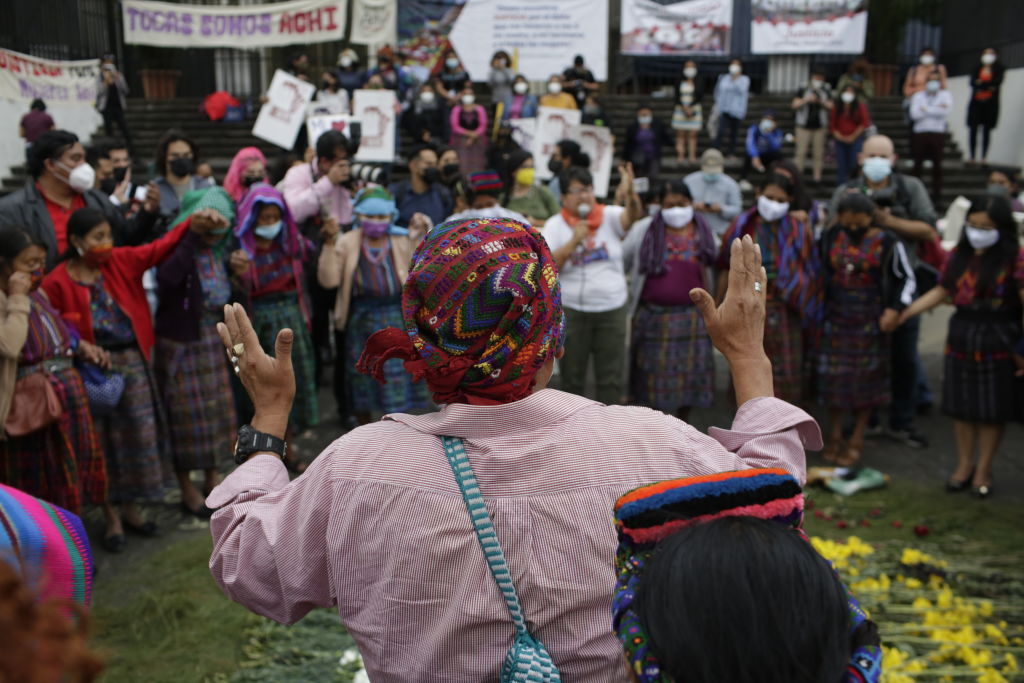
For the Maya Achi survivors who testified in court, the ordeal they faced in the early 1980s changed the course of their lives. The perpetrators followed a similar pattern for each crime: they killed or “disappeared” the women’s husbands before raping the women, many of whom were already pregnant, and destroying their homes and belongings.
Estefana Alvaro Sic lost her baby as a result of her rape. “I came to testify about everything I lived through,” she told the court. “I came with my feet, with my eyes because what happened to me has hurt me a lot.” Shunned by those who knew her, impoverished after the murder of her husband, she spent years struggling to feed her children. “I cry because I look at the people who have no pity,” she said of the perpetrators. “They have their corn, they have their car and I don’t even have food, I don’t have a husband, I am poor.”
Rabinal Legal Clinic, which represented the women involved in the Maya Achi trial, is an association of Indigenous lawyers, two of whom are Achi, and has worked to offer support to the victims. The firm provided psychological support to the victims in the 11-year investigation and preparation for the trial, which opened in 2011. “Most women 40 years later still have symptoms of post-traumatic stress disorder, depression, and anxiety,” Melissa González, the women’s psychologist, told TIME. “The after-effects have not advanced much, of course, but they persist.”
The stigma that the women carried back to their communities had a particularly pernicious effect on the women’s self-esteem. “We were asking them if their community knows about the sentencing,” González said. “They said ‘no, when we leave we won’t tell the truth, because it’s just a waste of time.’ Generally they receive many, many accusations. They are very stigmatised in their community.”
When López de Paz’s husband found out on their wedding night, when she was 15, that she had been raped, he attacked her. She testified in court that she later had three miscarriages, and when her first son was born, her womb “came out all at once.”
In their defense, the lawyers for the five men—who all pleaded not guilty—tried to undermine the women’s testimonies by claiming they were either false or could not be proven. It was a tactic that, to the women, made no sense. “They are accusing us of fabricating what we have been saying for 11 years?” one of the survivors asked Xiloj. “I could be happy there in my house, taking care of my chickens, there with my husband, with my grandchildren. What need do I have to be here if it weren’t for the fact that I am demanding justice?’”
The women haven’t always sought recognition of the violence they experienced. Xiloj says lawyers only discovered the incidents of mass rape in Rabinal when the survivors came to document a massacre to the Inter-American Court of Human Rights. “They came to denounce the disappearance of their husbands, the disappearance of their fathers, the murder of their children,” she said. “But they didn’t talk about what had happened to themselves.”
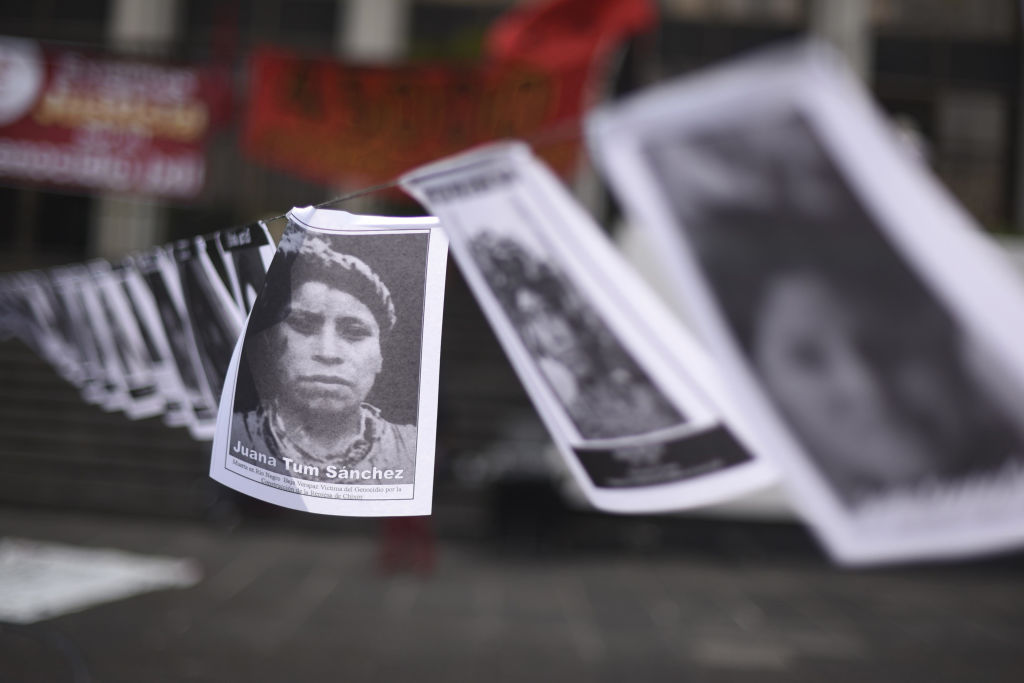
As the lawyers developed relationships with the women, they encouraged them to speak further about what had happened to them, a slow process given their damaged self-esteem. “At first they did not consider themselves as people who had the right to demand that the truth be known,” Xiloj says. The women’s primary language, Achi, does not have a word for rape. When the women did eventually describe what happened to them, they used alternative words or phrases—such as “they defiled my body,” and “they passed over me.”
The contrast between the women then and now is stark. A child at the time of her rape, like many of the victims—the Commission for Historical Clarification found that a third of rape victims were adolescents and children—López de Paz spent decades of her life burying what had happened to her. But speaking to TIME following the sentencing, she said she felt vindicated. “Yes, there was shame,” she said. “But I’m happy now, because the public realised that we’re not lying.”
Progress has been made in bringing the leaders of the genocide to justice. In August, a court ruled that the architect of the PAC, former head of the army Manuel Benedicto Lucas García, would stand trial for genocide, crimes against humanity, and forced kidnappings from 1978 to 1982. He has been held in preventative detention since 2016. Among a dozen of other human rights cases going through the Guatemalan courts, currently 12 senior and mid-ranking military and police officials are in the evidentiary phase for charges relating to the forced disappearances, rapes, and murders of at least 195 people from 1983 to 1986.However, Burt explains that these cases are pressing forward against great odds. Giammattei’s government, which has faced accusations of corruption since he assumed office in 2020, has strengthened its control of the Attorney General’s Office, undermining the independence of the judiciary. In 2019, under former President Jimmy Morales, a United Nations-backed anti-corruption commission, which oversaw the indictment of both the former president, Efraín Ríos Montt, and former vice-president, Roxana Baldetti, was forced to close its doors. The lead judge in the Achi case, Yassmín Barrios, who also oversaw the Sepur Zarco case in 2016, faced a backlash when she convicted Ríos Montt of genocide in 2013—10 days later, the ruling was overturned by a higher court. Less than a year later, Barrios was briefly sanctioned by the Guatemalan Bar Association in what many saw as a politically motivated move. Ríos Montt died in 2018 before his retrial had been completed.
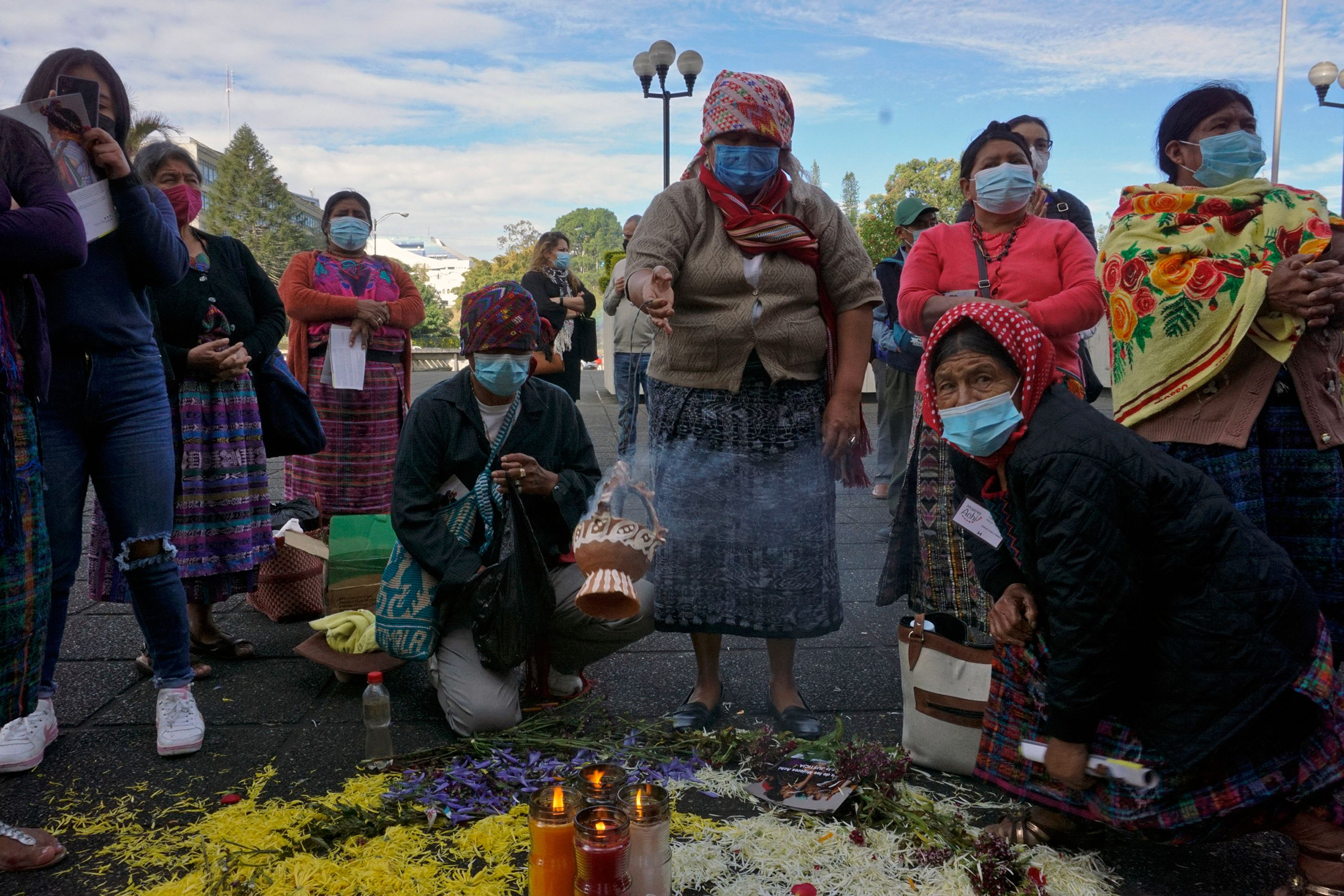
Despite the efforts of judges like Barrios, the judicial system in Guatemala is by nature exclusionary to Indigenous communities. Many Mayans can only communicate in their Indigenous dialects, and do not speak Spanish, the country’s official language. Burt witnessed a judge’s ruling in 2019 that dismissed the case against the three men yet to stand trial in the Achi rape case: “All of the women were in the gallery, and none of them understood what was going on until we exited the room, and the lawyers then explained to them what had happened.”
Rabinal Legal Clinic is currently appealing the pre-trial judge’s dismissal of the charges against the three remaining men. As the window to prosecute aging and dying officials closes, observers like Burt believe the Biden administration should step up to strengthen anti-impunity efforts in the Central American country. But the U.S. is sending mixed messages. In July, the U.S. suspended its cooperation with the Guatemalan Attorney General’s Office after it fired a prominent anti-corruption prosecutor. Five months later, however, Washington’s National Security Advisor met with Guatemala’s President and “applauded the Giammattei government’s work to combat criminal organizations involved in the trafficking and smuggling of drugs and people.”
The U.S. played an instrumental role in the Guatemalan civil war, helping to overthrow a democratically elected president in 1954 and funding the military’s persecution of leftist guerrilla forces. In 1999, President Bill Clinton made a rare apology, acknowledging the responsibility of the CIA. in the murder of communist insurgents and citizens alike. Yet, the U.S. government under Biden is loosening its responsibility to the Central American country. “The fundamental problem is they’re looking at Central America through the prism of the migration issue, because that issue was so politicised under Trump,” Burt says. Thousands of Guatemalan migrants arrive at the U.S. border every year, seeking an escape from poverty, alleged corruption and violence.
What’s needed, Burt argues, is targeted sanctions against those in power. This would not affect the general population, she says, but would signal international condemnation of a government sliding into soft authoritarianism.
For the Maya Achi women, getting justice is an ongoing process. Following the verdict on Jan. 24, the court held a reparations hearing to identify the compensation the victims were owed by the state. On Jan. 27, the court granted each plaintiff 300,000 Guatemalan quetzal ($39,000), access to new health centers for the community and medical treatment. Symbolic reparations, such as the production of a documentary and education grants for the women’s children and grandchildren, were also approved.
López de Paz views the reparations as an acknowledgement of the pain she still suffers today. “It’s my right,” she says. “I want them to replace what they took. The things they burned. My animals.” She also demanded that the men reveal the site of her parents’ remains—although they deny any involvement in their deaths. “It hurts to remember. I want it to be known that I suffered.”
She and the surviving Maya Achi women will also continue their search for justice as their lawyers attempt to bring the three men dismissed from the case to trial. This possibility is what keeps López de Paz going: “We have to keep fighting. It’s no longer the time to sleep.”
More Must-Reads from TIME
- How Donald Trump Won
- The Best Inventions of 2024
- Why Sleep Is the Key to Living Longer
- Robert Zemeckis Just Wants to Move You
- How to Break 8 Toxic Communication Habits
- Nicola Coughlan Bet on Herself—And Won
- Why Vinegar Is So Good for You
- Meet TIME's Newest Class of Next Generation Leaders
Contact us at letters@time.com